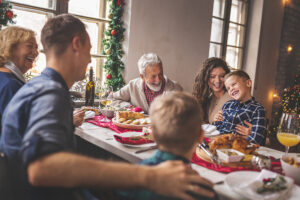How to cook an eco-friendly Christmas dinner and keep energy costs low
Is it possible to make those festive feasts more energy-efficient?
Tucking into a hearty feast is one of the big joys of the festive season. But with so many dishes and meals often requiring hours to prepare – is it possible to make cooking Christmas dinner more energy-efficient?
Being more eco-minded with cooking can help the planet and our bank balances, with energy bills so high right now.

Can cooking Christmas dinner be energy-efficient?
Keen to cook a more eco-friendly Christmas dinner and keep energy costs low? Read on for some top tips…
Keep a lid on it
“Keeping the lids on your pans during cooking uses 10% less energy – and helps food cook quicker,” says Jessica Forster, project manager at Energy Saving Trust.
Don’t boil water on the hob
A recipe may call for you to bring water to the boil directly on the hob, but this can be a serious waste of energy.
“It’s most efficient to transfer boiling water from your kettle to a pan on the hob,” says Forster. “And remember to only boil the amount of water you need each time.”
Use your microwave

Reheating in the microwave could save energy and cash
“If you’re reheating leftovers, microwaves are more efficient than electric and gas ovens,” says Forster – so keep that plate to one side, pop a lid with holes in on top and reheat in the microwave if you have one. Cling-film should be skipped, as this often amounts to huge amounts of unrecyclable plastic.
Buy something different
What you buy will have an impact too, be it on the cost to the planet or your wallet.
“When you’re doing your Christmas food shop, there are a couple of ways you can save money and be more eco-friendly while you’re at it. Start by buying fruit and veg loose with a reusable produce bag wherever possible – you’ll only pay for what you need, and reduce food waste and plastic packaging,” says Thomas Panton, CEO and founder of Greenr.
View this post on Instagram
“Many supermarkets and food shops now also sell ‘wonky veg’, which is almost always no different to any other veg, and it’s cheaper too (compared with other fresh produce).”
Reuse water
Chucking hot water away each time you need to reuse a pot? “Save water and energy by reusing water used to boil vegetables for gravy, stock, or for cooking other vegetables,” says Panton. “It’s already going hot and saves boiling a whole lot of water again.”
Scrap the meat

Cutting down on meat could be a helpful switch
Buying lots of meat may feel traditional at this time of year, but swapping in more veggie dishes could really help make Christmas more planet-friendly.
“Studies show that plant-based, vegetarian and vegan diets can reduce your impact, and plant-based meat can reduce carbon emissions by up to 98%,” says Panton.
“Christmas dishes like nut roasts can be made cheaply with lentils, rice and all sorts of other cheap ingredients. By adding it to the Christmas dinner table, you not only add more food but can spend less on meat, saving money and reducing your environmental impact,” he adds.
Use those gadgets

Slow cookers use less energy than traditional ovens
“There are a couple of kitchen cooking gadgets which you can use to reduce energy use and save money. Air fryers are all the rage this year, and with energy prices rising it’s no surprise. According to uSwitch, using a 900-watt air fryer for 20 minutes costs approximately 10p per meal,” says Panton.
“Slow cookers heat food over several hours using a small electric element, with a lid to keep steam and heat in the pot. It’s a great way to cook big batches of food and requires less attention than a hot electric hob or gas flame. If you’re on a renewable energy tariff, you’re also relying less on polluting fossil fuels like gas.”
The Press Association
Latest posts by The Press Association (see all)
- Best places to see bluebells this spring - April 2, 2025
- Does sunscreen expire? Everything you need to know about SPFs - April 2, 2025
- Top Gun and Batman star Val Kilmer dead at 65 - April 2, 2025
- Actor Richard Chamberlain dies aged 90 - March 30, 2025
- 5 new books to read this week - March 26, 2025




















